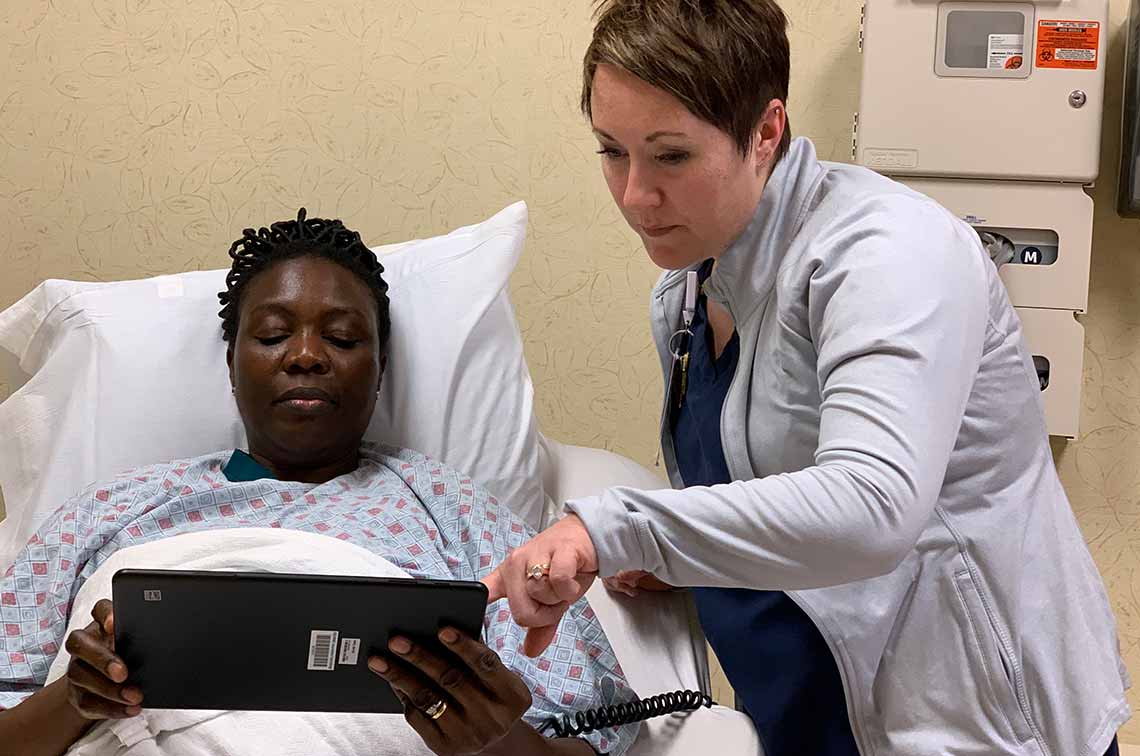
Discover how we're providing tools to improve access to health care.
Researchers at The Ohio State University have discovered a new, reliable way to detect fibromyalgia in blood samples, leading the way to quickly identifying a disease that's often misdiagnosed.
About 2 percent of the U.S. population has fibromyalgia, which can cause chronic pain, fatigue, depression, sleep problems and difficulty concentrating. Those who've been diagnosed waited an average of five years between the onset of symptoms and their diagnosis – a long time to be left wondering what's wrong and whether their symptoms are real.
Now, Ohio State experts in medicine and food science have identified biomarkers of fibromyalgia to differentiate it from other, related diseases, such as rheumatoid arthritis or systemic lupus erythematosus, making diagnosis much quicker.
Doctors currently diagnose fibromyalgia based on patient-reported symptoms and a physical evaluation of their pain – there's no clear-cut, easy-to-use tool to provide a quick diagnosis, says researcher Kevin Hackshaw, a rheumatologist at The Ohio State University Wexner Medical Center.
"Here, we found clear, reproducible metabolic patterns in the blood of dozens of patients with fibromyalgia," he says. "This brings us much closer to a blood test than we have ever been."
Hackshaw notes that identification of fibromyalgia biomarkers – a sort of "metabolic fingerprint" – could not only provide reliable diagnoses, but could also lead to targeted fibromyalgia treatments.
Fibromyalgia is currently incurable, and treatment is limited to exercise, education and antidepressants, Hackshaw says.
However, an accurate diagnosis helps confirm for patients that their symptoms aren't imagined, and it guides doctors toward disease recognition and appropriate treatment.
Hackshaw and study co-author Luis Rodriguez-Saona say the next step is to build a larger-scale clinical trial to determine if the success they saw in this research could be replicated.
"These initial results are remarkable," Rodriguez-Saona says. "If we can help speed diagnosis for these patients, their treatment will be better and they'll likely have better outlooks. There's nothing worse than being in a gray area where you don't know what disease you have."
“Researchers at The Ohio State University have discovered a new, reliable way to detect fibromyalgia in blood samples, leading the way to quickly identifying a disease that's often misdiagnosed.” Click to tweet this story
Rodriguez-Saona, a professor of food science and technology at Ohio State, is an expert in the advanced testing method used in the study. His lab typically uses the metabolic fingerprinting technology for food-related research, focusing on quality assurance, detection of food adulteration and helping agriculture companies screen for crop varieties with improved quality and nutritional traits.
The chance to partner with medical experts to help solve the problem of fibromyalgia misdiagnosis was exciting, Rodriguez-Saona says.
"Collaboration of Ohio State physicians and scientists in very different disciplines is vital to finding research innovations that lead to new therapies for patients. In this case, patients who struggle to manage the chronic pain and fatigue of a debilitating disease," Hackshaw says.
He says his goal for this research is to have a test ready for widespread use within five years.
Eventually, Rodriguez-Saona says, this work could lead to the identification of a particular protein or acid – or combination of molecules - that's linked to fibromyalgia.
In addition to identifying fibromyalgia, the researchers say they found evidence that the metabolic fingerprinting technique could determine the severity in an individual's fibromyalgia.
"This could lead to better, more directed treatment for patients," Hackshaw says.
Many other conditions share some of same symptoms as fibromyalgia, so getting an accurate diagnosis is important.